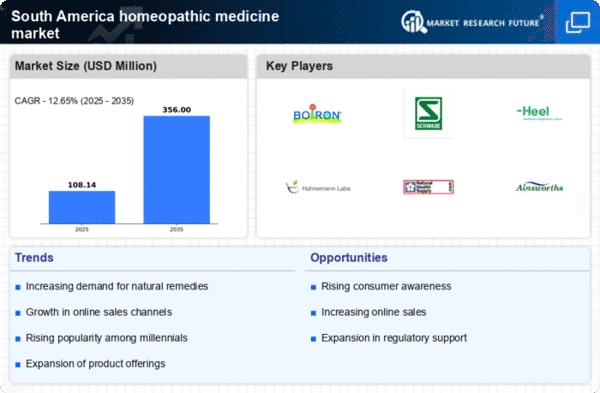Support from Health Professionals
The endorsement of homeopathy by health professionals is a vital driver for the homeopathic medicine market in South America. As more healthcare practitioners advocate for the use of homeopathic treatments, consumer trust in these remedies is likely to increase. This support is often rooted in positive patient experiences and outcomes, which can lead to referrals and recommendations. Market data indicates that approximately 30% of healthcare providers in South America are now incorporating homeopathic options into their practice. This trend not only enhances the credibility of homeopathy but also encourages patients to explore these alternatives. The growing collaboration between homeopathic practitioners and conventional doctors may further solidify the position of homeopathy within the broader healthcare landscape, ultimately benefiting the homeopathic medicine market.
Increasing Awareness of Homeopathy
The growing awareness of homeopathy among consumers in South America is a pivotal driver for the homeopathic medicine market. Educational initiatives and health campaigns have contributed to a better understanding of homeopathic principles and practices. As individuals seek alternatives to conventional medicine, the appeal of homeopathy, which emphasizes natural remedies and holistic approaches, has surged. This trend is reflected in market data, indicating that the homeopathic medicine market in South America is projected to grow at a CAGR of approximately 12% over the next five years. The increasing number of practitioners and clinics specializing in homeopathy further supports this awareness, leading to a broader acceptance and utilization of these treatments across diverse demographics.
Growth of Herbal and Natural Products
The rising popularity of herbal and natural products is a crucial driver for the homeopathic medicine market in South America. Consumers are increasingly inclined towards products that are perceived as safe and effective, leading to a surge in demand for homeopathic remedies. This trend is evident in market data, which shows that the herbal medicine segment is expected to grow at a CAGR of 10% over the next five years. The homeopathic medicine market benefits from this growth, as many homeopathic products are derived from natural sources. Additionally, the increasing availability of these products through various retail channels, including pharmacies and health stores, enhances consumer access and encourages trial. This shift towards natural solutions aligns with the broader global trend of seeking sustainable and eco-friendly health options.
Rising Interest in Preventive Healthcare
The shift towards preventive healthcare is significantly influencing the homeopathic medicine market in South America. Consumers are increasingly prioritizing health maintenance and disease prevention over reactive treatments. This trend aligns with the principles of homeopathy, which focuses on treating the individual rather than just the symptoms. As a result, there is a growing demand for homeopathic products that support overall wellness. Market data suggests that the preventive healthcare segment is expected to account for a substantial share of the homeopathic medicine market, with an estimated value of $1.5 billion by 2026. This shift is likely to encourage manufacturers to innovate and expand their product offerings, catering to the evolving preferences of health-conscious consumers.
Integration of Homeopathy in Conventional Healthcare
The integration of homeopathy into conventional healthcare systems is emerging as a significant driver for the homeopathic medicine market in South America. Healthcare providers are increasingly recognizing the benefits of complementary therapies, including homeopathy, in enhancing patient outcomes. This trend is supported by research indicating that patients often seek holistic approaches to their health, leading to a collaborative model between conventional and alternative medicine. As a result, hospitals and clinics are beginning to incorporate homeopathic treatments into their services. This integration not only legitimizes homeopathy but also expands its reach, potentially increasing the market share of the homeopathic medicine market. The collaboration between practitioners may lead to a more comprehensive approach to patient care, fostering greater acceptance among the general population.

















